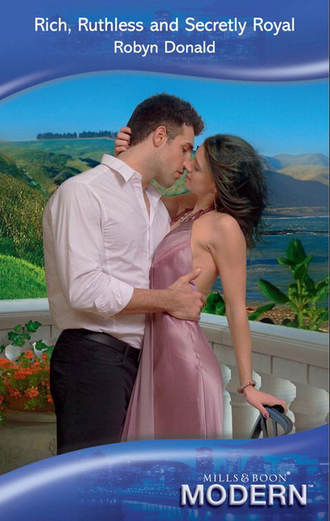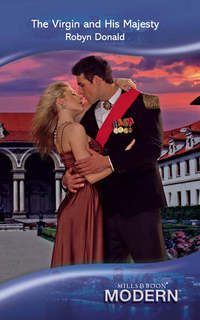
Полная версия
Rich, Ruthless and Secretly Royal
‘Thank you—I will,’ she said remotely.
And produced a smile she held until he’d swung up onto his horse and guided it away.
Her face felt frozen when she took refuge in the cottage and stood listening as the sound of hooves dwindled into the warm, sea-scented air. She shivered, crossing her arms and rubbing her hands over her prickling skin.
Again? she thought in mindless panic. The unbidden, unwanted surge of sensual appetite humiliated her. Why on earth was she attracted to dangerous men?
Not that she’d realised Felipe was dangerous when she first met him. And for some unfounded and quite illogical reason she couldn’t believe Kelt would turn out to be like Felipe.
As well, the heady clamour Kelt Gillan summoned in her was different—more earthy and primal, nothing like the fascinated excitement she’d felt when Felipe had pursued her. He’d seemed such a glamorous, fascinating man, with his French title and his famous friends. At eighteen she’d been so green she’d run headlong into peril without a second thought.
Six years older, and much better able to look after herself, she sensed a different danger in Kelt Gillan—a more elemental attraction without the calculation that had marked Felipe’s seduction.
Desperate to take her mind off her enigmatic landlord and his unnerving effect on her, she went across to the kitchen and put on the electric kettle.
‘Displacement activity,’ she said aloud, a mirthless smile curling her mouth as she spooned coffee into the plunger.
Wrapping her attraction to Felipe in a romantic haze had got her into deep trouble; this time she’d face her inconvenient response to Kelt Gillan squarely. Coffee mug in hand, she walked out onto the deck and stood looking out over the sea.
No emotions, no fooling herself that this was love, no silly claptrap about soulmates. She’d already been down that track and it had led to humiliation and heartbreak and terror. Felipe had played on her naivety, setting himself out to charm her into submission.
And succeeding utterly, so that she’d gradually been manipulated into an affair without fully realising where she was heading. When she’d realised what sort of man he was she’d tried to break away, only to have him bind her to him with the cruellest, most degrading chains. To free herself she’d had to sacrifice everything—self-respect, love for her brother, her very future.
Closing her eyes against the dazzling shimmer of the sun on the bay, she thought wearily that she hadn’t planned for her sacrifice to last the rest of her life.
In fact, she hadn’t planned on any further life.
Well, a Mediterranean fisherman with smuggling as a sideline had seen to it that she’d survived. She shivered, and for a foolish few seconds wondered if Kelt Gillan had brought on another attack of fever.
No, her chill was due to memories she wished she could banish.
Only right now she needed them to remind her that no person could ever see into the heart of another, especially when they were blinded by lust.
Ruthlessly she dragged her mind back to the present, and concentrated on the problem at hand—her feelings for Kelt Gillan.
‘Just think rationally,’ she told herself.
What she felt when she looked at Kelt was a powerful physical attraction for a man both formidable and enormously attractive—a primal arousal with a scientific basis. Humans instinctively recognised the people they’d make superb babies with.
Logic played no part in it, nor did common sense. But both could be used as weapons against it, and if she’d learned anything these past six years it was that any relationship between lovers needed much more than desire to be a success.
And there would be no babies for her, ever.
So she’d have dinner with Kelt and then she’d stay well away from him.
Hani missed the children the next day, and not for the first time wondered what on earth she was going to do for three months. Too many empty weeks stretched before her, leaving her far too much time to think, to remember. Without the steady routine of school she faced more than simple boredom; she’d have to deal with emptiness.
At least the cottage had a set of bookshelves stuffed with books of all ages and quite a few magazines. After a brief walk along the beach that reminded her again how unfit she was, she sank into a chair on the deck with a cup of tea and a volume on New Zealand that looked interesting.
She flicked it open and saw a bookplate. Kelt Crysander-Gillan, it stated.
‘Unusual,’ she said aloud. There was an inscription too, but she turned the page on that, feeling as though she was prying.
With a name like that, and if Kelt’s air of forceful authority had led to a nickname like The Duke, imaginative children could well come up with a crown-wearing grandmother somewhere in Europe.
At precisely seven o’clock he arrived to collect her as the sun was dipping behind the forest-covered mountains that ran down the central spine of Northland’s long, narrow peninsula. He drove a large, luxurious four-wheel-drive, which gave Hani a moment of heart-sickness; her brother used to drive the same make…
Hani pushed the thought to the back of her mind. Rafiq thought she was dead, and that was the way she had to stay.
And then Kelt got out, lithe and long-legged, powerfully magnetic and urbane in a short-sleeved shirt that echoed the steely colour of his eyes, and casually elegant trousers, and the bitter, heart-sick memories vanished, replaced by a reckless excitement.
When he opened the gate she went hastily out into the serene evening. The bach might be his, but she didn’t want to sense his dominating presence whenever she walked into the living room.
She knew she looked good. For an hour that afternoon she’d pored over her scanty wardrobe, startled to find herself wistfully remembering her favourites amongst the designer clothes she’d worn in her old life.
In the end she’d chosen a modest dress she’d found in a shop in Tukuulu’s small capital city. Although it was a little too loose on her, the clear salmon hue burnished the gold of her skin and the warm highlights in her dark hair.
Tempted to go without make-up, she decided after a critical survey of her reflection that a naked face might make her look conspicuous, and her security depended on blending in. So she compromised on lipstick a slightly deeper shade than her dress, and pinned her badly cut hair off her face with two frangipani clips made from the moonbeam shimmer of pearl shell.
Kelt waited for her beside the gate. Her shoulders held a little stiffly to hide an absurd self-consciousness, she walked towards him, sensing a darker, more elemental level beneath his coolly sophisticated exterior. Trying to ignore the smouldering need in the pit of her stomach, she saw him as a warrior, riding his big bay gelding into battle…
Not, she thought with an inner shiver, a man to cross swords with.
With a carefully neutral smile she met his gaze, and in a charged moment her wilful memory sabotaged the fragile veneer of her composure by supplying a repeat of how it had felt when he’d carried her—the powerful litheness of his gait, the subtle flexion of his body as he’d lifted her, his controlled strength…
CHAPTER THREE
KELT examined her face with the impersonal keenness of a doctor. ‘How are you?’ he asked, opening the door of the car.
Hani’s smile faded. His persistent view of her as an invalid was—demeaning, she decided on a spurt of irritation that didn’t quite mask a deeper, more dangerous emotion. After all, in the light of her unexpected attraction, it was far safer if he saw her as an invalid than as a woman.
A desirable woman.
With a hint of frost in her tone she answered, ‘Fine, thank you.’ And met his scrutiny with head held high and an immobile face that belied the unsteady rhythm of her heart.
‘You still have dark circles under your eyes. Lack of sleep?’
Strangely enough, for the first time since she’d come to this side of the world all those years ago she’d slept deeply and dreamlessly, waking with an energy that seemed alien.
‘No, not at all,’ she told him evenly. Steering the conversation away from her illness, she asked, ‘How far away is your house?’
‘About a kilometre by road; half that distance if you walk across the paddocks—which I don’t want you to do.’ He set the car in motion.
‘Why?’
He sent her a narrow glance. ‘You could spook the cattle.’ After a pause, he added, ‘Or they might spook you.’
Hani examined some large, square animals, their coats glowing deep red-gold in the rays of the evening sun. ‘They don’t look excitable, but your point is well taken.’
Not that she planned to be going cross-country.
‘And you?’ he asked levelly, turning across a cattle grid.
She waited until the rattling died away before saying, ‘I don’t understand.’
‘Are you excitable?’
Startled, she looked across at him, saw an enigmatic smile tuck in the corners of his hard mouth, and was shocked again by a fierce tug of arousal, sweet as honey, dangerous as dynamite.
Surely he wasn’t flirting with her?
She felt winded and fascinated at the same time until a moment’s reflection produced sanity. Of course he wasn’t coming on to her. Not unless he was the sort of man who indulged in meaningless flirtations with any available woman.
Somehow she didn’t want to believe he’d be so indiscriminate. A man with Kelt Gillan’s effortless masculinity could have any woman he wanted, and he must know it. And unlike Felipe he had nothing to gain from seducing her.
In her most sedate tone she said, ‘Not in the least. Teachers can’t afford to be volatile. It’s very bad for discipline.’
That should tell him she wasn’t in the market for a holiday affair. To clinch it, she said, ‘Don’t worry, I won’t walk in your fields or excite your cattle.’
‘Paddocks,’ he said laconically, explaining, ‘New Zealanders call anything with animals in it a paddock. Fields are what we play sport on, and as far as we’re concerned meadows don’t exist.’ He nodded at the setting sun. ‘And that range of hills to the west is covered in native bush, not forest or woods.’
Intrigued, she said, ‘I do know about bush. One of the Australian teachers at the school explained it to me. It’s fascinating how countries colonised by the same power could develop such different words to describe things. In South Africa—’
She stopped suddenly, her mind freezing in dismay, then hastily tried to cover the slip by asking the first question that came to mind. ‘What are those trees, the ones that grow in groups in nearly all your f—paddocks?’
‘They’re totara trees.’
‘Oh. Do they flower?’
‘Not noticeably—they’re conifers. As for terminology—well, the world would be a boring place if we were all the same. Settlers in different countries adjusted to different conditions.’ He paused a beat before adding casually, ‘You’re not South African, are you?’
‘No,’ she said, dry-throated.
‘But clearly you’ve been there.’
Trying to banish any reluctance from her voice, she admitted, ‘I spent a holiday there when I was young.’
He accepted that without comment. ‘So what made a young Englishwoman decide to spend years teaching in a village school in a place like Tukuulu? The lure of tropical islands I can understand, but once you’d got to Tukuulu and realised it’s really nothing but a volcano with a huge mine on it—beaches of dead coral, only one fleapit of a hotel, no night life—what kept you there?’
A little shudder tightened her skin, but she kept her gaze fixed steadily ahead. Let him probe as much as he liked; she had her story down pat.
‘I wanted to help. And they were desperate for teachers. It’s really hard for them to keep staff. But the principal is your friend so you must know that.’
After a moment’s pause he said, ‘How long do you plan to live there?’
‘For several years yet,’ she evaded.
‘I imagine it’s unusual for anyone to stay for long in a Pacific backwater like Tukuulu.’ Let alone a young Englishwoman, his tone implied.
‘You’re a sophisticated man but you don’t seem to mind living on a remote cattle station in a Pacific backwater like New Zealand,’ she retorted sweetly.
He gave her swift, ironic smile. ‘Don’t let any New Zealander hear you call the place a backwater. We’re a proud people with plenty to be proud of.’
‘The Tukuuluans are proud too, and doing their best to move into the modern world without losing the special things that make their culture so distinctive.’
‘I suspect that’s an impossible task,’ he said cynically.
‘I hope not. And I like to think I’m helping them in a small way.’
They crossed another cattle grid and drove through a grove of the big trees she’d noticed before, their great branches almost touching the ground.
‘Oh,’ she exclaimed in involuntary pleasure, ‘the leaves are silver underneath! From a distance the trees look so sombre—yet how pretty they must be when there’s any wind.’
‘Very, and when they flower in a month or so they’ll be great torches of scarlet and crimson and maroon. I’ll take you over the top of the hill so you can look over Kiwinui and get some idea of the lie of the land.’
Kelt slowed the vehicle to a stop, switching off the engine so that the silence flowed in around them, bringing with it the sweet scent of damp grass and the ever-present salt of the sea.
Gaze fixed in front of her, Hani said on an indrawn breath, ‘This is glorious.’
‘Yes.’
That was all, but his controlled voice couldn’t hide the pride of ownership as he gazed out at his vast domain.
At the foot of the hill a sweeping bay fronted a large, almost flat, grassed area with what appeared to be a small settlement to one side. More huge trees fringed the beach and a long jetty stitched its way out into the water towards a sleek black yacht and a large motorboat.
‘The working part of Kiwinui,’ Kelt told her. He leaned slightly towards her so he could point. ‘Cattle yards, the woolshed, implement sheds and the workers’ cottages.’
Hani’s breath stopped in her throat. He was too close, so near she could see the fine grain of his tanned skin, so close her nostrils were teased by a faint, wholly male scent. Hot little shivers snaked down her spine, and some locked, previously untouched part of her splintered into shards.
Desperate to overcome the clamour of her response, she scrambled from the car and took a couple of steps away. When Kelt joined her she didn’t dare look at him.
Several measured breaths helped calm her racing heartbeats, and as soon as she could trust her voice she waved a hand at the nearest hill. ‘What’s that mown strip over there?’
‘An airstrip. Kiwinui is too big to fertilise except from the air.’ His words held a lick of amusement, as though he had sensed her stormy reaction to him and found it entertaining.
Mortified and bewildered, Hani wondered if the forced intimacy of their first meeting had somehow forged this—this wild physical reaction.
Yes, that had to be it. Relief eased her shame; her response was not some weird aberration or a frightening return to the servitude of her affair with Felipe. Kelt had held her closely, given her comfort while she fought the fever—changed her clothes—so naturally her body and mind responded to his presence.
Well, they could stop it right now. Discipline was what was needed here. She didn’t want to feel like this every time she saw him, completely unable to control herself!
Trying to block out his presence, she concentrated on the view. To the north a series of ranges scalloped the coast, the lower-slopes pasture, the gullies and heights covered by forests—no, native bush—that reminded her of the jungles of Moraze. Between them she glimpsed a coast of sandy beaches and more green paddocks.
Stretching to the eastern horizon was the restless sea, its kingfisher-coloured expanse broken by a large, high island that formed an offshore barrier.
And, to cap it all, she heard the high, exquisite trill of a bird, joy rendered into song that soared into the golden light of the setting sun. Pierced by sudden delight, Hani dragged in a long breath.
And even as she thrilled to it, she knew that the man beside her somehow intensified her mood, her appreciation, as though his presence had the power to magnify her responses.
Felipe had never done that.
Hani swallowed. ‘It’s so beautiful,’ she managed. ‘What’s the bird that’s singing?’
He gave her a sharp look. ‘It’s a thrush,’ he said. ‘They were introduced here by the early settlers. He’ll be perched on top of one of the pohutukawa trees.’
Bother, she thought on a surge of irrational panic, oh, bother and double-bother! Too late she remembered a poem she’d learned at school; if she were as English as her accent she’d probably recognise a thrush’s song…
On the other hand, why should Kelt be suspicious? And even if he was, he wouldn’t be able to find out who she was. Once she’d escaped Felipe she’d covered her tracks so well that even he, with all his resources in brutal men and tainted money, hadn’t been able to hunt her down.
Kelt told her, ‘The original homestead was down on the flat, quite close to the workers’ cottages you can see, but when it burned down early in the twentieth century the new one was built up here.’
Hani filed away the fact that in New Zealand—at least in the countryside—substantial houses were called cottages. ‘What’s the difference between a cottage and a homestead and a bach?’
‘A bach is a holiday cottage, always casual, very beachy. They used to be small and primitive, but nowadays that isn’t necessarily so.’
‘No indeed,’ she said, thinking of the bach she was staying in.
He gave her an ironic smile. ‘My grandmother made quite a few renovations to it. She enjoyed the simple life for a short time, but had no intention of giving up any comfort.’
His grandmother had clearly been a sophisticate. Well, Kiwinui was a big farm, and Hani didn’t need to know the size of his bank balance to accept that Kelt was a wealthy man.
Kelt said, ‘As for workers’ cottages, the term’s a hangover from the days when they were fairly basic. Nowadays no worker would be happy with basic housing, and even if he was his wife certainly wouldn’t be, so they’re usually good-sized family homes.’
‘And a homestead is where the owner of the farm lives?’ she guessed.
‘Either the owner or manager’s house on a farm or station.’
Hani nodded. ‘Is this estate—Kiwinui—a farm or a station? What’s the difference?’
‘Basically a station is a larger farm—usually settled early in New Zealand’s history. The first Gillan arrived here about a hundred and forty years ago. And yes, Kiwinui is a station.’
Hani looked down at the bay, frowning at the abrupt change of colour in the water. ‘It looks as though it gets deep very quickly there,’ she observed. ‘Surely my cove—’ colouring, she hastily corrected herself ‘—I mean, the one with the bach, would be safer for the children? I truly don’t mind them coming, and I’d be happy to supervise their swimming. And young Kura seems very capable.’
‘We’ll see how things go.’ His tone was non-committal. ‘When those dark circles disappear then perhaps the children can pay you visits.’
Hani sent him a sharp look. ‘The darkness under my eyes will go in its own good time. And I enjoy children’s company.’
‘You’ll enjoy it more when you’re stronger.’
His tone left no room for negotiation. Fuming, Hani decided that autocratic wasn’t emphatic enough to describe him. Clearly he was accustomed to giving orders and seeing them obeyed.
Конец ознакомительного фрагмента.
Текст предоставлен ООО «ЛитРес».
Прочитайте эту книгу целиком, купив полную легальную версию на ЛитРес.
Безопасно оплатить книгу можно банковской картой Visa, MasterCard, Maestro, со счета мобильного телефона, с платежного терминала, в салоне МТС или Связной, через PayPal, WebMoney, Яндекс.Деньги, QIWI Кошелек, бонусными картами или другим удобным Вам способом.








